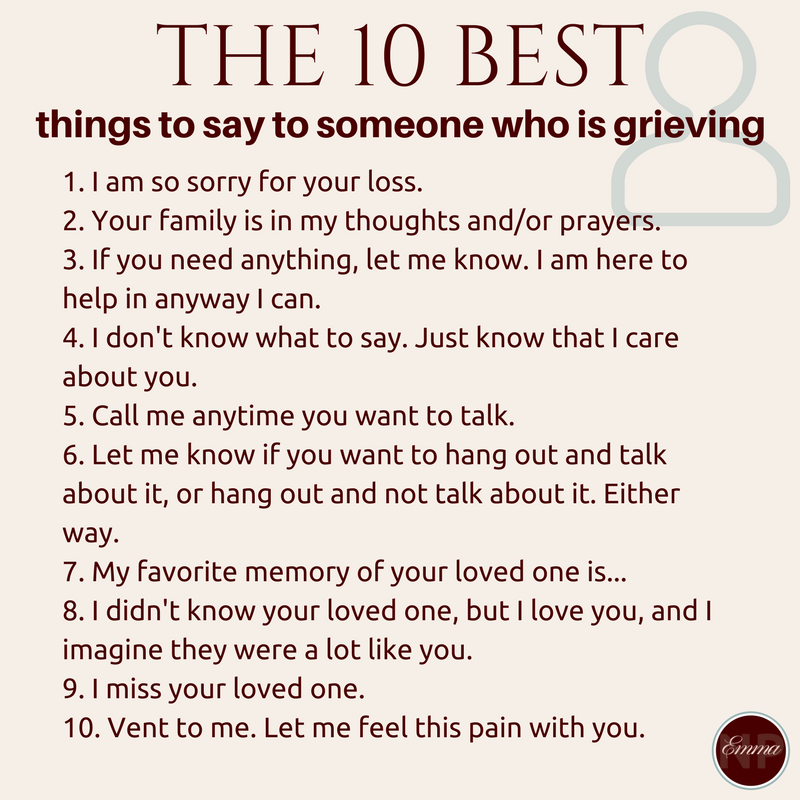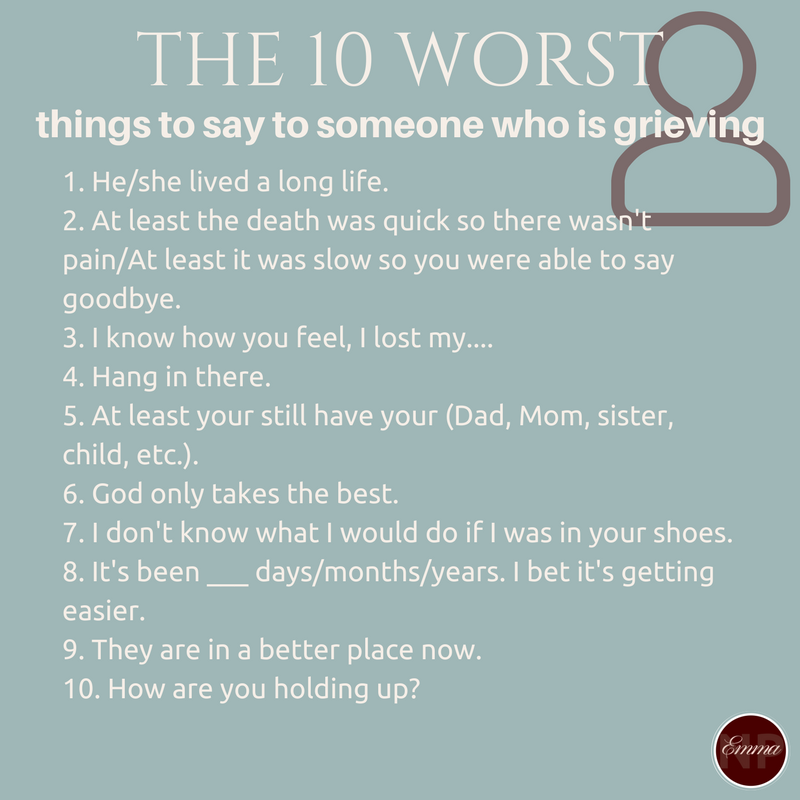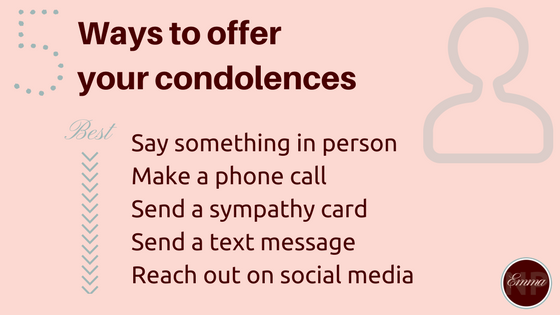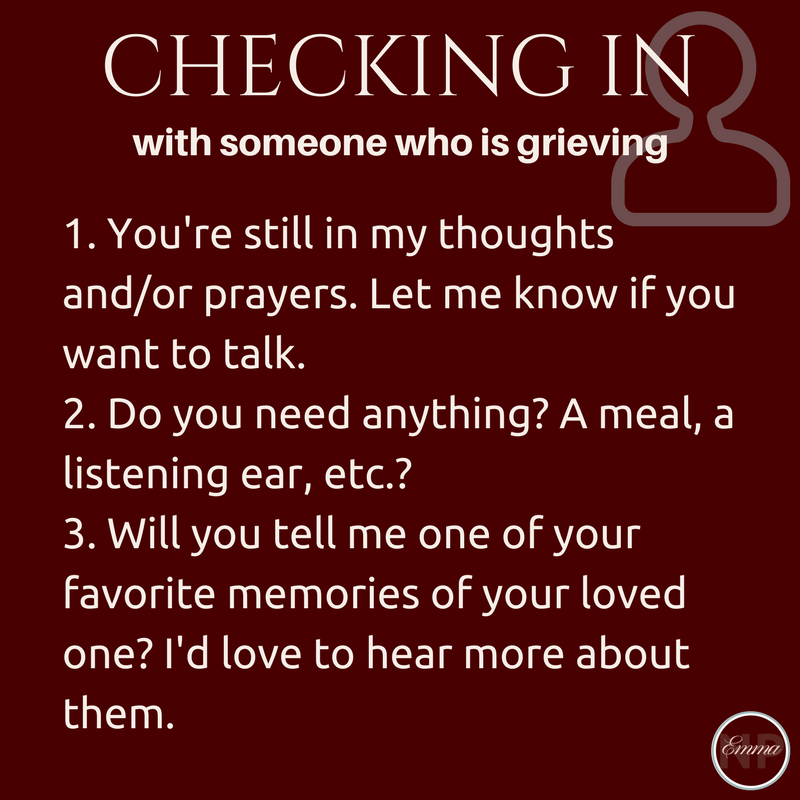Saying something is better than saying nothing.
When someone you care about loses their friend or family member, it can be difficult to know what to say. You want to be supportive, but talking about death is uncomfortable. You don’t want to upset them, or worse, offend them.
After the loss of my grandmother and mother August, 2017, I noticed that people felt awkward around me. Very few have ever brought up my losses in person. My best guess is that they didn’t want to upset me if I seemed to be in a good mood. The truth is, I am always thinking about my recent losses. I often describe it as an invisible open wound. Bringing it up feels a lot like offering me a Band-Aid. While it won’t stop the bleeding, it may help contain it.

If you only take one thing away from this post, let it be this: someone who is grieving just needs to hear that you care. Say something. Never say nothing.

For me, the greatest thing to hear was memories of my mom. It was so comforting to hear how she helped others. For those that didn’t know my mom well, it was nice to hear that they were thinking of me and praying for me.

Don’t worry if you’ve made one of the comments above to someone who is grieving. It can be very hard to know what to say and your friend knows that your heart is in the right place, even if your words weren’t perfect.

Those first few weeks were the hardest. I struggled when people told me about their prior loses and compared them to mine. ‘Your loss is nothing like mine,’ I selfishly thought, ‘I lost my grandma and mom within 11 days of each other. There’s no way you can relate.’ Now, I find comfort in hearing stories from those that have lost someone. It’s like we’re all in a very sad club.
For the record, “How are you holding up?” is a fine question in a deeper conversation, but starting with, “How’s it going?” or similar is an impossible question for me to answer in regards to my recent losses. My knee-jerk reaction is, “Umm…not well?” Instead, try a more direct question like, “How is your family handling this recent tragedy?”
It’s difficult to know how to offer your condolences. Many of my friends offered their condolences over social media, a few sent text messages, a handful sent sympathy cards, a couple called or said something in person, some said nothing.
Below are some ways to let the grieving person know that you care, ranked from the best, most helpful way, to what you should do at the very least. I appreciated every single note of condolences I received. I saved everything that was sent to me regarding the loss of my mom and I go back and read them when I’m feeling alone. Once again, just say something! Even if it’s just a note on Facebook that says, “I’m sorry for your loss.”

After a few months things may appear to be back to normal, but your friend is still grieving and will be for years to come. They need to know that you still care, and by checking in you are showing that their loss is still on your mind, too. Here are a few simple ways to check in.

It is also worth noting that everyone grieves differently. When in doubt, ask, “Do you want to talk about it?” Your friend should be honest with you. Remember, they’re dealing with a wide range of emotions and may feel like talking about it one day and the next day they may not.
Occasionally, someone will take me off guard and offer their condolences in front of a group of people, in those moments I am doing my best not to cry and wish they would have pulled me aside for a private conversation. When I am put on the spot to talk about my grief I am more likely to give surface level answers to maintain my composure, but when I’m talking to someone one on one I am more likely to open up.
Almost everyone will experience the loss of a loved one at some point in their life. Understanding how to be supportive in these situations is an invaluable skill to have.
Thanks for reading,
Emma









Products listed above are from Amazon Associates which means Emma No Problema gets cash if you purchase them. Thanks in advance.






















 I hated to wear nail colorful nail polish on my fingers because it made my bitten nails look SO OBVIOUS (see old photo of my bitten, painted nails to the right). Instead, I started to put a clear coat of nail polish on them. They looked so shiny and beautiful and I wasn’t nearly as tempted to bite them off as I usually was. I also kept them filed and trimmed because another one of my weaknesses was uneven nails, if my nails felt uneven I would try to even them out by biting them.
I hated to wear nail colorful nail polish on my fingers because it made my bitten nails look SO OBVIOUS (see old photo of my bitten, painted nails to the right). Instead, I started to put a clear coat of nail polish on them. They looked so shiny and beautiful and I wasn’t nearly as tempted to bite them off as I usually was. I also kept them filed and trimmed because another one of my weaknesses was uneven nails, if my nails felt uneven I would try to even them out by biting them.


